Despite it all, there are many who struggle and are addicted to the abuser with a sense of attachment. Find the scientific reasons behind this biochemical bond.
Your Brain on Love, sex and the Narcissist by Shahida Arabi
This article was originally published on April 2015 on Self-Care Haven and is an excerpt from a copyrighted book, Fifty Shades of Narcissism: Your Brain on Love, sex and the Narcissist. It has been reprinted on The Minds Journal with the permission of the author.
Many survivors of narcissistic abuse are confounded by the addiction they feel to the narcissist, long after the abusive relationship took a toll on their physical, mental, and emotional well-being.
Make no mistake: recovery from an abusive relationship can be very similar to withdrawal from drug addiction due to the biochemical bonds we may develop with our toxic ex-partners.
Discussion of biochemical bonding within the context of narcissistic abuse has been scarce, and during my research of how different chemicals and hormones can affect us during the abuse cycle, I realized that our brain chemistry is not on our side when it comes to detaching from toxic, abusive partners.
What keeps you addicted to the abuser?
Understanding why we are addicted permits us to recognize that our addiction is not about the merits of the narcissist, but rather the nature and severity of the trauma we’ve experienced.
It enables us to detach and move forward with powerful knowledge that can propel us towards greater agency and healthier relationships than the ones we’ve experienced in the past.
In addition, it challenges the victim-blaming discourse in society that prevents many abuse survivors from gaining support and validation for the traumas they’ve experienced – validation that would actually help people addicted to the abuser, not hinder, these survivors in leaving their abusive relationships.
Survivors struggle with No Contact and may suffer many relapses on the road to recovery from the psychological trauma of the relationship.
Aside from the reasons I’ve proposed in this blog post on why abuse survivors stay in abusive relationships, I thought I’d explore how our own brain chemistry can lock us into this addiction to the narcissist or sociopathic partner.
Some of these same biochemical bonds also make it difficult for us to detach from non-narcissistic partners and compel us to remain addicted to the abuser.
4 Reasons Why You’re Addicted To The Abuser
1. Oxytocin
This hormone, known famously as the “cuddle” or “love hormone,” is released during touching, orgasm, and sexual intercourse; it promotes attachment and trust. It is the same hormone released by the hypothalamus that enables bonding between mother and child.
During “love bombing” and mirroring in the idealization phases with our abusive partners, it’s likely that our bond to them is quite strong as a result of this hormone.
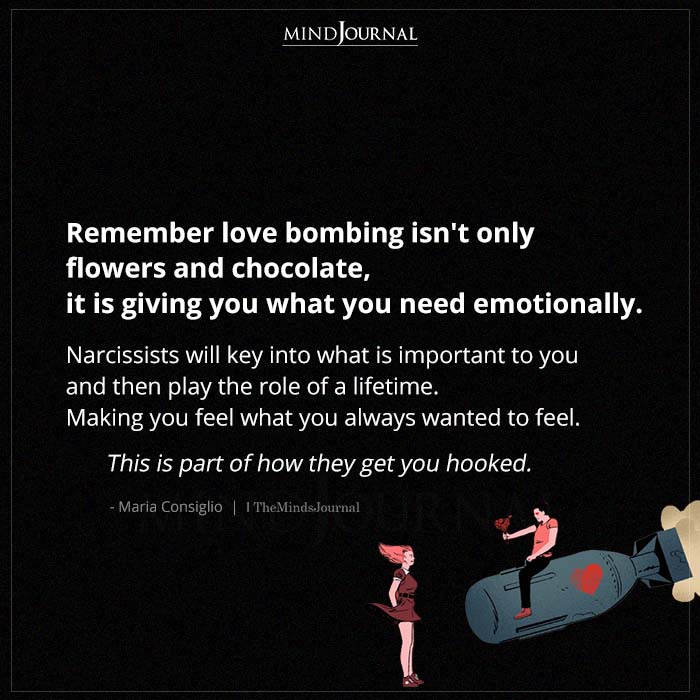
Intermittent reinforcement of positive behaviors dispersed throughout the abuse cycle (e.g. gifts, flowers, compliments, sex) ensures that we still release oxytocin even after experiencing incidents of abuse.
Related: Love Bombing as a Narcissistic Attachment Style
I’ve heard from many survivors who reminisce about the great sexual relationship they had with the narcissist, containing electrifying sexual chemistry they feel unable to achieve with future partners.
This is because charming emotional predators such as narcissists are able to mirror our deepest sexual and emotional desires, which leads to a strong sexual bond, which then, of course, releases oxytocin, and promotes even more trust and attachment.
Meanwhile, the narcissist, who is usually devoid of empathy and does not form these types of close attachments, is able to move onto his or her next source of supply without much thought or remorse.
On the dark side, sex with a narcissist can also be devaluing, manipulative, and abusive in itself, especially if the narcissist in question engages in highly risky sexual behaviors or attempts to coerce victims into engaging in sexual acts that they don’t feel comfortable with.
This can also bond victim to the abuser because it conditions the victim to associate fear with sex and betrayal with love – creating a trauma bond that will be discussed later in this article.
Related: 5 Ways To Disarm A Love Bombing Sociopath
The addictive nature of oxytocin is also gendered according to Susan Kuchinskas, author of the book, The Chemistry of Connection: How the Oxytocin Response Can Help You Find Trust, Intimacy, and Love.
The unfortunate fact is that estrogen promotes the effects of oxytocin bonding whereas testosterone discourages it. This makes it more difficult for females in any type of relationship to detach from the bond as quickly as men. Hence, they remain addicted to the abuser.
2. Dopamine
The same neurotransmitter that is responsible for cocaine addiction is the same one responsible for addiction to dangerous romantic partners.
According to Harvard Health, both drugs and intense, pleasurable memories trigger dopamine and create reward circuits in the brain, essentially telling the brain to “do it again.”
Related: How to Supercharge Your Dopamine Levels Naturally and Never Feel Depressed Again
Do you remember recalling the pleasurable, beautiful first moments with your narcissistic partner? The romantic dates, the sweet compliments and praise, the incredible sex – long after you two had broken up? Yeah – it’s releasing the dopamine in your brain that’s telling you to “do it again.”
The salience theory of dopamine suggests that our brain releases dopamine not just for pleasurable events but to important ones that are linked to survival.
As Samantha Smithstein, Psy.d, puts it, “Dopamine is not just a messenger that dictates what feels good; it also tells the brain what is important and what to pay attention to in order to survive. And the more powerful the experience is, the stronger the message is to the brain to repeat the activity for survival.”
Abuse survivors are unfortunately hijacked by dopamine. Abusive tactics like intermittent reinforcement work well with our dopamine system because studies show that dopamine flows more readily when the rewards are given out on an unpredictable schedule rather than predictably after conditioned cues.
Related: How Narcissists Make You Physically Sick and 5 Ways To Restore Your Health
So the random sweet nothings whispered to us after an incident of emotional abuse, the apologies, the pity ploys, the rare displays of tenderness during the devaluation phase, right before another incident of abuse – actually help cement this type of reward circuit rather than deter it.
Combine this with powerful experiences of abuse that alert our brain to “pay attention” as well as pleasurable memories we recollect over and over again – and we’ve got ourselves a biochemical bond from hell – that’s how victims remain addicted to the abuser.
3. Cortisol, Adrenaline and Norepinephrine.
Cortisol is a stress hormone, and boy, does it get released during the traumatic highs and lows of an abusive relationship. It is released by the adrenal glands in response to fear as part of the “fight or flight” mechanism.
Since we are unlikely to have a physical outlet of release when cortisol is triggered during cycles of emotional abuse, this often traps the stress within our bodies instead.
As we ruminate over incidents of abuse, increased levels of cortisol lead to more and more health problems. Christopher Bergland suggests numerous ways to counteract the effects of this hormone, which include physical activity, mindfulness, meditation, laughter, music, and social connectivity.
Related: How Stressed Are You? Take This Stress Quiz To Find Out
Adrenaline and norepinephrine also prepare our body for the flight or fight response and are also culprits in biochemical reactions to our abusers.
Adrenaline promotes an antidepressant effect, triggering fear and anxiety which then releases dopamine – this can cause us to become “adrenaline junkies,” addicted to the rush of vacillating between bonding and betrayal. During No Contact, withdrawal from that “rush” can be incredibly painful.
Related video on being addicted to toxic relationships:
4. Trauma bonding
All of these jolts of fear and anxiety in the face of danger can reenact past traumas and create trauma bonding. Trauma bonding occurs after intense, emotional experiences with our abusers and tethers us to them, creating subconscious patterns of attachment that are very difficult to detach from.
It is part of the phenomenon known as Stockholm Syndrome, in which victims of hostage become attached to their perpetrators and even defend their captors.
Related: 5 Roles We Play In A Narcissist’s Life
Although survivors of narcissistic abuse come from many different backgrounds and anyone can be a victim of narcissistic abuse, trauma bonding is even more significant for those who grow up in violent or emotionally abusive homes, and/or have had a narcissistic parent in addition to their most recent experiences with trauma and abuse.
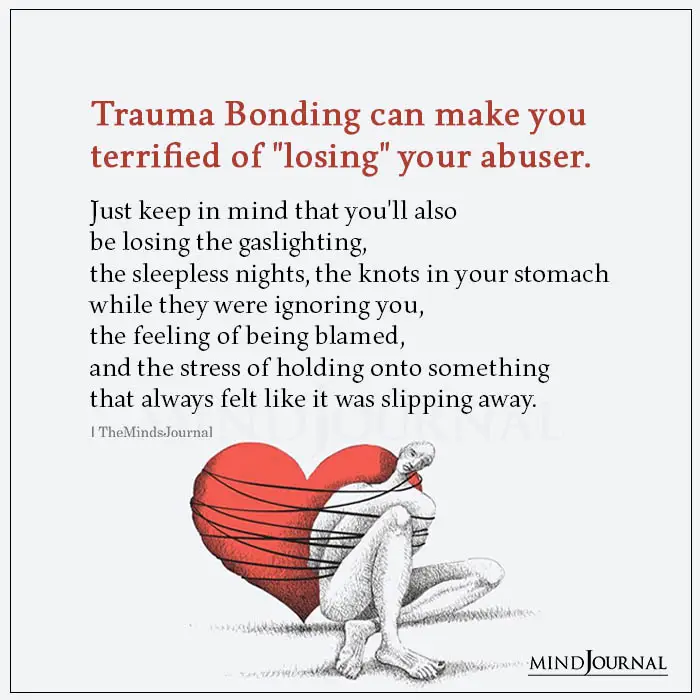
Survivors of multiple incidents of abuse by various narcissistic individuals can further reinforce subconscious wounds they experienced in childhood in the trauma bond with their current abusers. If there has been victimization in the past, such as the experience of having to survive in an abusive household, this can lead to trauma repetition or reenactment, the root of which Gary Reece, Ph.D in his article, “The Trauma Bond,” calls “relational trauma”:
“The key to understanding behavior found in abusive relationships is to look at the very early years of childhood. Relational trauma is at the root…. There are several features these kinds of relationships have in common.
The first is, they are deeply ambivalent, reflective of the Trauma Bond: fear, dependency, need, fear of abandonment, despair, the realization of helplessness, and rage. This is an amalgam of very powerful emotions that drive and make the relationship so unstable…
The second feature of this kind of relationship is that it is a compulsive reenactment. Allan Schore, an attachment expert put it this way. “A further complication of unresolved trauma is a narrative reenactment of the trauma wherein the victim unconsciously recreates the original traumatic event over and over.”
For more information on trauma bonding, please see The Betrayal Bond: Breaking Free of Exploitative Relationships (2013) by Patrick Carnes. Also be sure to check out Gary Reece’s blog, The Hero’s Journey.
It is important to understand the various types of biochemical and psychological bonds that often create attachments between abusers and their victims and compels a victim to be addicted to the abuser.
Better understanding these bonds enables us to move past victim-blaming and move forward into greater understanding, compassion, and support for survivors who struggle with leaving abusive relationships. We must not judge but continue to empower ourselves and others with this new-found knowledge.
If you liked this article, be sure to check out the extended version of this article in its e-book version.
Copyright © 2015, 2016 by Shahida Arabi.
All rights reserved. No part of this entry may be reproduced, distributed, or transmitted in any form or by any means, including photocopying, recording, or other electronic or mechanical methods, without the prior written permission of the author. This includes adaptations in all forms of media.
Inspired by the post? Instead of reiterating ideas from this post or posting it in its entirety it without permission – please consider sharing the link through social media to help other survivors.
Interested in learning more about narcissistic abuse? Pre-order my new book on narcissistic abuse, Becoming the Narcissist’s Nightmare: How to Devalue and Discard the Narcissist While Supplying Yourself.
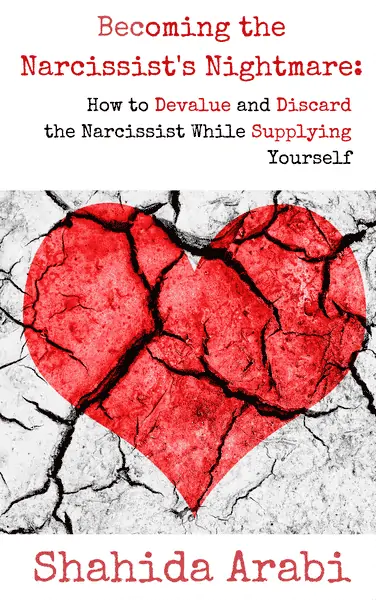


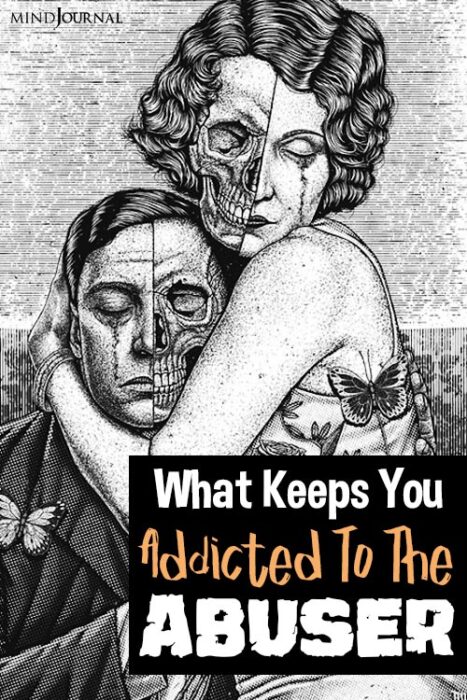
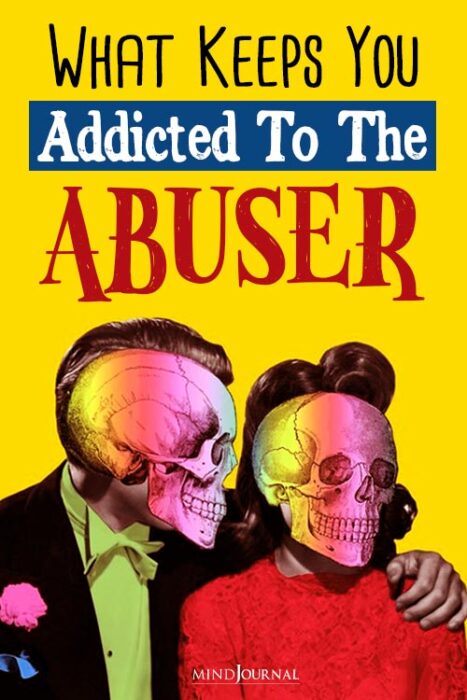








Leave a Reply
You must be logged in to post a comment.